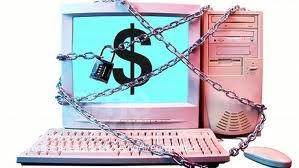SOPA: Sites go dark in protest
For those who didn't notice, the internet was a little quieter than usual today.
Several major sites, including Google, Wikipedia and Wordpress have come out today in support for the anti-SOPA protests, currently going on in America. They did this by removing content, blacking-out logos and, in some cases, taking down the entirety of their public front end.
The protests are centered around two pieces of American legislation currently shuffling their way through Congress. The first is the titular Stop Piracy Act (SOPA), the second the Protect Intellectual Property Act (PIPA).
Protecting American jobs/Investment
These pieces of legislation have been designed to aggressively tackle the issue of online piracy and copyright infringement. They will allow the American Department of Justice to pursue sites accused of enabling or facilitating online piracy.
Senator Chris Dodd, Chairman of the Motion Picture Association of America, is an outspoken opponent of the protests. He said: "Some technology business interests are resorting to stunts that punish their users or turn them into their corporate pawns, rather than coming to the table to find solutions to a problem that all now seem to agree is very real and damaging."
He later added: "It is an irresponsible response and a disservice to people who rely on them for information. A so-called 'blackout' is yet another gimmick, albeit a dangerous one, designed to punish elected and administration officials who are working diligently to protect American jobs from foreign criminals."
Steve Tepp, chief intellectual property counsel at the chamber's Global Intellectual Property Center, describes the new laws to the BBC as "two pieces of legislation that are narrowly tailored and commercially reasonable for taking an effective swipe at the business models of rogue sites."

Breaking the internet
Despite the reassuringly calm voices of the pro-SOPA lobby, there is massive discontent emanating from across the internet.
Of course it is reasonable for companies to want to protect their assets from theft, which is what the proposed legislation is supposed to do, but there are many that feel these new laws are draconian and unfair. There is a growing concern that these laws could also be abused in the future, allowing the Government to shut down dissenting websites, effectively giving the US Government the power of censorship over their slice of the internet.
Wikipedia has shut down their whole English language service, posting a note on the site that SOPA could "could fatally damage the free and open Internet." Wordpress has posted something eerily similar.
Google didn't go so far as to shut down their service, but American users who logged on today were greeted by a blacked-out box. They also posted this blog in which they suggest that SOPA will not even stop piracy.
The blogs explains that "Pirate sites would just change their addresses in order to continue their criminal activities. There are better ways to address piracy than to ask U.S. companies to censor the Internet. The foreign rogue sites are in it for the money, and we believe the best way to shut them down is to cut off their sources of funding."
Where to now?
The future of these controversial pieces of legislation is still up in the air, but there are forces working hard to make sure that they happen.
It is in the interests of the entertainment industry to shut down as many pirate sites as possible, and there are high-placed people working tirelessly to ensure this new legislation is passed. Their determination to see this through will be tested though, as it seems that each step of the process will be challenged and argued against by both companies and private individuals alike.
What is at stake here is more than just money and profit margins (which is the only thing the SOPA legislation is interested in - for now); the battle being fought over in America is for nothing less than the very soul of the internet. Right now we're talking about downloads, but in the future who knows what other areas this censorship may spread to?
Hopefully a balance can be found; one that allows entertainment companies to protect their assets from pirates, but one that also ensures that internet remains a free and open place. Let's hope it can be done, because if not, chances are the money men will win out and the freewheeling nature of the internet might become a thing of the past.
<bild></bild>